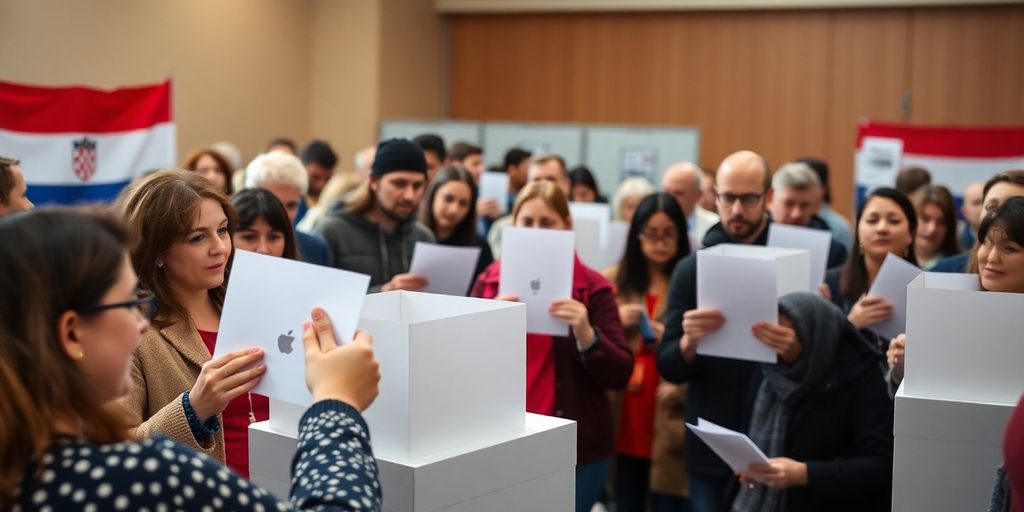Croatia is gearing up for its presidential elections, with the first round set for December 29 and the second round on January 12. This election follows a series of significant political events, including general elections and European elections earlier in the year, marking a pivotal moment in Croatian politics.
Key Takeaways
- Election Dates: First round on December 29, second round on January 12.
- Candidates: Eight candidates, including incumbent Zoran Milanović and Dragan Primorac.
- Public Sentiment: Polls indicate Milanović is favored to win.
- Political Climate: Tensions between the President and Prime Minister highlight deep political divides.
Overview of the Election
The upcoming presidential elections in Croatia are set against a backdrop of political tension and public scrutiny. The elections will conclude a ‘super year’ of political activity, following the general elections in April and the European elections in June. Croatians living abroad will have the opportunity to vote at 105 polling stations across 38 countries, with the largest numbers in Bosnia-Herzegovina and Germany.
Candidates in the Race
A total of eight candidates are vying for the presidency:
- Zoran Milanović (Independent) – The outgoing President, supported by a coalition of left-leaning parties.
- Dragan Primorac (Independent) – Backed by the ruling Democratic Union (HDZ) and other right-wing parties.
- Marija Selak Raspudić (Independent) – A philosopher and MP.
- Ivana Kekin (We Can! Party) – An MP focused on environmental issues.
- Tomislav Jonjić (Party of Rights) – A lawyer and diplomat.
- Niko Tokic Kartelo (Independent) – A businessman.
- Branka Lozo (Fatherland and National Unity) – A professor.
- Miro Bulj (Bridge Party) – An MP and mayor.
Polls suggest that Milanović is leading with approximately 37.4% of the vote, followed by Primorac at 20.8%. Other candidates are trailing significantly.
The Campaign Landscape
Milanović’s campaign slogan, "For the presidency, vote for the president," emphasizes a vision of a self-reliant Croatia that prioritizes its citizens’ interests. Despite his popularity, his tenure has been marked by controversy, particularly regarding his relationship with Prime Minister Andrej Plenković. The two leaders have clashed over various issues, including Croatia’s involvement in NATO and support for Ukraine.
Plenković has criticized Milanović’s approach, labeling it as detrimental to national security and stability. He argues that Croatia needs a president who respects the Constitution and fosters constructive political dialogue.
Public Sentiment and Issues at Stake
Recent surveys reveal a divided public opinion on key issues, including immigration and national security. While many citizens support the idea of Croatia being open to tourists and returnees, there is significant resistance to accepting asylum seekers. This sentiment reflects broader concerns about national identity and security, which are likely to influence voter behavior in the upcoming elections.
Conclusion
As Croatia approaches its presidential elections, the stakes are high. With a polarized political landscape and pressing national issues, voters will have to decide whether to continue with the current leadership or embrace a new direction. The outcome will not only shape the future of Croatia but also its role in the broader European context.
Sources
- Presidential Election 2024 Croatia, Fondation Robert Schuman.
- All eyes and hands on deck ahead of Croatia’s presidential elections – Euractiv, Euractiv.
- Only a third of citizens believe that Croatia should be open to asylum seekers – N1, n1info.hr.
- President Milanović: I Support the Demands of Croats in BiH to be Granted Right to Manage Gas Pipeline, This is in Croatia’s National Interest – President of the Republic of Croatia – Zoran Milanović, Predsjednik Republike Hrvatske – Zoran Milanović.
- President Milanović: In these troubled times we live in, we need to focus more on ourselves and think about our own interests – President of the Republic of Croatia – Zoran Milanović, Predsjednik Republike Hrvatske – Zoran Milanović.






